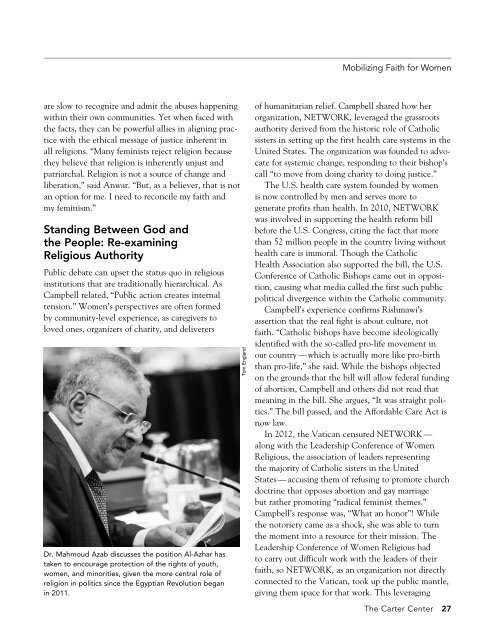v1E3z
v1E3z
v1E3z
You also want an ePaper? Increase the reach of your titles
YUMPU automatically turns print PDFs into web optimized ePapers that Google loves.
Mobilizing Faith for Womenare slow to recognize and admit the abuses happeningwithin their own communities. Yet when faced withthe facts, they can be powerful allies in aligning practicewith the ethical message of justice inherent inall religions. “Many feminists reject religion becausethey believe that religion is inherently unjust andpatriarchal. Religion is not a source of change andliberation,” said Anwar. “But, as a believer, that is notan option for me. I need to reconcile my faith andmy feminism.”Standing Between God andthe People: Re-examiningReligious AuthorityPublic debate can upset the status quo in religiousinstitutions that are traditionally hierarchical. AsCampbell related, “Public action creates internaltension.” Women’s perspectives are often formedby community-level experience, as caregivers toloved ones, organizers of charity, and deliverersDr. Mahmoud Azab discusses the position Al-Azhar hastaken to encourage protection of the rights of youth,women, and minorities, given the more central role ofreligion in politics since the Egyptian Revolution beganin 2011.Tom Englandof humanitarian relief. Campbell shared how herorganization, NETWORK, leveraged the grassrootsauthority derived from the historic role of Catholicsisters in setting up the first health care systems in theUnited States. The organization was founded to advocatefor systemic change, responding to their bishop’scall “to move from doing charity to doing justice.”The U.S. health care system founded by womenis now controlled by men and serves more togenerate profits than health. In 2010, NETWORKwas involved in supporting the health reform billbefore the U.S. Congress, citing the fact that morethan 52 million people in the country living withouthealth care is immoral. Though the CatholicHealth Association also supported the bill, the U.S.Conference of Catholic Bishops came out in opposition,causing what media called the first such publicpolitical divergence within the Catholic community.Campbell’s experience confirms Rishmawi’sassertion that the real fight is about culture, notfaith. “Catholic bishops have become ideologicallyidentified with the so-called pro-life movement inour country — which is actually more like pro-birththan pro-life,” she said. While the bishops objectedon the grounds that the bill will allow federal fundingof abortion, Campbell and others did not read thatmeaning in the bill. She argues, “It was straight politics.”The bill passed, and the Affordable Care Act isnow law.In 2012, the Vatican censured NETWORK —along with the Leadership Conference of WomenReligious, the association of leaders representingthe majority of Catholic sisters in the UnitedStates — accusing them of refusing to promote churchdoctrine that opposes abortion and gay marriagebut rather promoting “radical feminist themes.”Campbell’s response was, “What an honor”! Whilethe notoriety came as a shock, she was able to turnthe moment into a resource for their mission. TheLeadership Conference of Women Religious hadto carry out difficult work with the leaders of theirfaith, so NETWORK, as an organization not directlyconnected to the Vatican, took up the public mantle,giving them space for that work. This leveragingThe Carter Center 27


